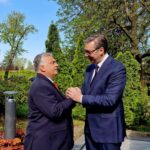- Biden warns of the danger for the Balkans if aid to Ukraine is halted
U.S. President Joe Biden warned that peace in Europe, in particular in the Balkans, could break if Congress fails to pass a decision on supplemental aid to Ukraine.
If the U.S. withdraws assistance and Russia ultimately defeats Ukraine, the Balkans will face a Russian threat, as will Poland and Hungary, Biden said at a Conference of Mayors in Washington on January 19.
“If we leave, and Russia withstands their attack and defeats Ukraine, what do you think will happen in the Balkan countries? What do you think will happen from Poland to Hungary?” said the U.S. president.
- The strongest army in the Western Balkans region is that of Serbia, which has improved its position and is now ranks 56th as per Global Firepower Index.
A total of 145 countries are on the list.
Albania is significantly behind, in the 90th position.
North Macedonia ranks 110th, Bosnia and Herzegovina – 116th, and Montenegro – 129th.
Partially recognized Kosovo, which has no own army, ranks 135th (security forces).
Global Firepower has been publishing the rating of countries’ military might since 2006. The research examines the potential for warfare on land, at sea, and in the air, taking into account more than 60 factors.
- In the period from 2014 to 2023, Serbia spent about $2.87 billion on the purchase of weapons.
The amount does not include the MiG-29 aircraft, T-72B1MS tanks, and BRDM-2MS armored fighting vehicles transferred to Serbia by Russia.
This is stated in the research by RTS TV’s Dozvolite… program.
In 2014, the Serbian army had a military budget of $777 million. The share of the defense budget in the gross domestic product (GDP) of Serbia stood at 1.6%.
In 2015, these indicators amounted to $515 million, or 1.35% of GDP.
In 2016 it was $654 million, or 1.6% of GDP. Two helicopters were purchased from Russia and the process of helicopter purchases from Airbus began.
In 2017, the Serbian military budget was $639 million, or 1.54% of GDP.
In 2018, it was about $867 million, or 1.71% of GDP.
In 2019, the military budget of Serbia amounted to $986 million, or 1.92% of GDP. The procurement of the Chinese SAM launchers FK-3 (the export version of the HQ-22 air defense system), the Russian Pantsir-S1 SAM launchers, and Russian Mi-17 and Mi-35 helicopters has begun.
In 2020, Belgrade allocated $1.05 billion for the defense budget, which was 2% of GDP.
In 2021 it was $1.463 billion, or 2.54% of GDP.
In 2022 it was $1.247 billion, or 1.97% of GDP.
In 2023 it was $1.51 billion, which is the largest amount in the recent history of the country, standing at 2% of GDP.
- The increase in the military budget in the period from 2014 to 2023 was seen in all countries across the Western Balkans (in dollar terms).
North Macedonia increased defense spending by 2.37 times.
Serbia – by 1.94 times.
Albania – by 2.08 times.
Montenegro – by 1.9 times.
Bosnia and Herzegovina increased its military budget rather symbolically, by a mere 5%.
- From February 1, euro to become only currency allowed for cash payment transactions in Kosovo.
The Serbian dinar will be withdrawn from circulation in Kosovo, as per the decision made by the Central Bank of Kosovo (CBK).
“The only currency allowed for cash payment operations in Kosovo’s cash payment system is the euro,” states the CBK Regulation. Other currencies may be used “only as physical storage values” or in bank accounts, for international payments or currency exchange transactions.
The National Bank of Serbia noted that the decision by the Central Bank of Kosovo practically prohibits the use and availability of dinars for citizens of Kosovo and Metohija who receive government pensions, salaries and social benefits in dinars, prevents the withdrawal of dinars from ATMs, post offices, and financial institutions, as well as transactions between citizens and entities in dinars.
The National Bank of Serbia called for the immediate cancellation of measures preventing the circulation of dinars in Kosovo and emphasized that “the provisional institutions of self-government in Kosovo and Metohija are in no way authorized to declare the euro (or any other foreign currency) the only legal currency in Kosovo and Metohija, but nor can the euro be legal tender in Kosovo and Metohija, as the National Bank of Serbia is the only competent issuer authorized to make decisions on the use of the dinar throughout the territory of the Republic of Serbia.”
The largest Serb party in Kosovo, Serb List, said the decision by “the regime of [Kosovo Prime Minister] Albin Kurti” was “a decision to expel the Serbs from these territories without the use of weapons.”
EU spokesman Peter Stano, responding to questions about the Central Bank’s decision, which will take effect on February 1, said the bloc is still analyzing the matter, including the motives and implications. Kosovo and Serbia should avoid uncoordinated actions that do not contribute to normalization and may have a negative impact on the situation on the ground, said Stano. He repeated the call to both sides to resolve the issue within the framework of the EU-mediated dialogue for normalization.
President Aleksandar Vučić asked the President of the European Commission, Ursula von der Leyen, to influence Pristina so that Kosovo does not cancel payment transactions in dinars.
- Mutual free access to labor markets of Serbia, Albania, North Macedonia as part of Open Balkans initiative postponed
This was announced by the government of North Macedonia.
The signing of the document on the mutual opening of the labor market in the “Open Balkans” member states was announced on January 21 in Skopje, during the regular meeting of the leaders of this regional initiative – the prime ministers of North Macedonia and Albania, Dimitar Kovacevski and Edi Rama, as well as President of Serbia, Aleksandar Vučić.
The introduction of free access to the labor market, as announced, is postponed until the moment when + technical conditions for the application of the agreement will have been fully created in each of the countries that have joined the initiative – Albania, Serbia, and North Macedonia. “Currently, the protocols related to the conditions of free access to the markets, as well as electronic identification schemes, have been agreed upon. Based on them, the technical groups in each proceed with appropriate finalization,” the statement reads. Coordination and technical tests “showed that more time is needed to test and configure services in the systems of the three countries to make them publicly available to all citizens.” “Institutions responsible for implementation are actively working on additional testing and harmonization of the system, taking into account the importance, needs, and benefits for citizens,” the North Macedonian government said.
- Serbian President Aleksandar Vučić presents program “Leap into the Future – Serbia Expo 2027”.
The formal occasion for the presentation was the preparation for the Expo 2027 International Exhibition, which will be held in Belgrade, but the document presented by Vučić represents the country’s development plan for the next four years. The program is designed for the period from 2024 to 2027 and provides for raising the standard of living of citizens, implementing projects in the fields of science and technology, education, health care, ecology, infrastructure development, industry, energy, agriculture, and tourism. The essence of all the projects that were presented is a successful Serbia, said Vučić.
Investments in projects scheduled for the next four years, including preparations for Expo 2027, will be at the level of the country’s annual budget and amount to EUR 17.8 billion.
In 2027, if Serbia succeeds and fulfills the plan, it will increase its gross domestic product to EUR 92.7 billion, which will tripple the figures of 2012, Vučić noted.
A prerequisite for the implementation of all scheduled projects is the preservation of peace, the Serbian president emphasized, adding that the country will not deviate from its European path. “Under these conditions, given such a geopolitical situation around the world, the priority for us is to preserve peace in the region if we cannot influence the global situation. It is also important that, despite the fact that we are often rightly angry because of the statements voiced by many in Europe, especially when it comes to Kosovo and Metohija and the territorial integrity of our country, Serbia must send a clear message tonight that it will try to accelerate its European path, preserving, of course, our traditional friends, preserving our freedom and independence,” Vučić emphasized.
- Kyiv asks Belgrade to shut down Viktor Medvedchuk’s “Other Ukraine” office in Serbia
The Embassy of Ukraine in Serbia has filed an official protest twitho the Ministry of Foreign Affairs of the Republic of Serbia, which contains a request to terminate the activities of the representative office of “Other Ukraine” in Serbia.
Diplomats substantiate such a request by the provisions of Art. 29 of the Law of the Republic of Serbia on Commercial Entities, which does not allow the use of the name of a country in the official title of a legal entity without the permission of the relevant foreign state.
The Embassy of Ukraine emphasizes that there is also a political aspect to the issue. “Serbia is a candidate country for EU membership, which, together with 140 other countries around the world, condemned the bloody war against Ukraine, declaring Russia an aggressor state. It is with sadness that we have to state that the attempts by certain political forces to implement an anti-Ukrainian scenario, to promote the spread of dirty provocations from the godfather of the international criminal Putin,” the Ukrainian diplomatic mission said in a reply to the Serbian newspaper Danas.
The “Other Ukraine” representative office, whose official founder is Viktor Medvedchuk, was launched in Serbia in 2023. The legal representative of the organization in Serbia is Dragan Stanojevic, who had been under Ukraine sanctions since September 2015. At the latest parliamentary elections in Serbia, Stanojevic was elected deputy from the “We are the Voice of the People” list, led by Branimir Nestorovic.



